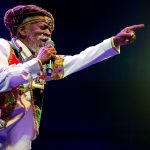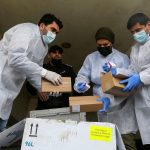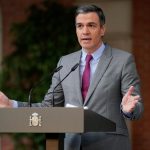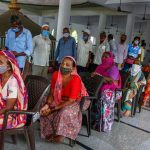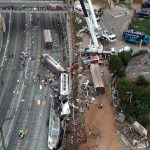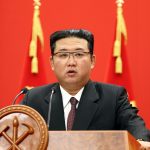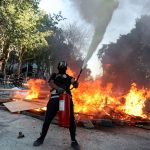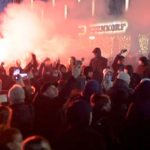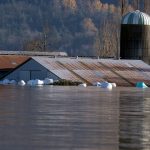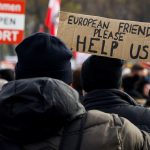The crowd of mujahideen are smiling but many are carrying rocket-propelled grenades on their shoulders and guns slung around their backs.
It’s a tough look to pull off – friendliness with a hint of menace but somehow they’re managing it.
“There is no way we will give in to the Taliban,” they repeatedly tell us. “We will fight to the death.”
A young man is standing in the middle of them, wearing a fawn-coloured traditional Afghan hat which is sitting at a jaunty angle and he’s addressing them with the relaxed confidence of a practised public speaker. They hang on his every word.
Please use Chrome browser for a more accessible video player
There are a collection of different groups here – including some in green uniforms who say they’re the ‘new mujihadeen recruits’ ready to go into battle. There are others in Afghan police uniforms. There are a number of older men with long wispy white beards who are brandishing RPGs which look as old as them – as well as young, tall fighters standing with a certain swagger which comes when you’ve a fully-stocked ammunition vest wrapped around your torso.
As the young orator draws breath, an older mujahideen (Islamic fighter) near the front of the crowd jumps in to express his respect and fondness for him, fan-boy style.
Ahmad Massoud smiles broadly, a little embarrassed, and touches his chest in appreciation, thanking him. He is the physical embodiment of his assassinated father, Ahmad Shah Massoud, the national hero responsible for so many significant military battles in Afghanistan.
The elder Massoud’s picture is plastered on every other home, shop and business here in the Panjshir Valley in northern Afghanistan. He is the French-speaking warrior who formed the Northern Alliance, bringing together different arms of mujahideen to first beat back the Soviets, but then also hold the Taliban at bay.
He was blown up by two men posing as journalists two days before 9/11, cementing his position forever more as the country’s martyred legend. His son was only 12 when he lost his father but Ahmad Massoud has grown up knowing he may have to step up at a time such at this. He looks uncannily like his father.
The elder generation must surely see this engaging charismatic young man as the reincarnated version of their hero.
He turns to our camera as he’s in the crowd and tells us: “They’re gonna fight for democracy. They’re gonna fight for the rights of the people. They’re gonna fight for the rights of women…and they’re going to fight for many other values that we cherish and we love and we have achieved in the past two to three decades…so these are the things they are ready to defend.”
As we sit together in the beautiful valley garden of his childhood home, he recounts conversations with his father which have been seared on his brain ever since.
“It’s not a choice,’ he says. “It’s something that I must do and we all must do because this is our home and we must make our stand here. We must defend our country. We must defend our people. We must defend our values.”
He’s lived in the shadow of his father all his life. And as a politician he now finds himself the target of death threats and suicide attack attempts.
The day before our trip to Panjshir, he talks about his security entourage averting another attempted attack.
It is part of the fabric of his life. He is surrounded by heavily armed guards and his convoy through Kabul up to the north is furiously fast with his security detail, setting up a decoy vehicle to try to protect their charge.
“For me, every day that I wake up, I want to do something good,” Mr Massoud tells us. “I want to do something to really bring change. That is the cause of my life. And I cannot see myself living comfortably somewhere, knowing that I could do something, even something small in this land, in this country to help the people who really deserve support and help.”
“It is not that I’m trying to act like my father. This is the meaning of my life. I don’t think about the length of the life or how long I’m going to live. But how I’m going to live is most important. What is a more sacred cause than defending the people, the innocent, defending the civilians, defending democracy and peoples’ rights, human rights, women’s rights, freedom of speech and freedom? What’s more sacred than defending that? If it takes my life? Well, then I lived a very meaningful life. That’s the goal of my life. So that is what drives me.”
He was educated in London but says he always intended returning to work for his country – and now he worries it is a crucial junction in Afghanistan’s tortured history.
With reports of the Afghan National Army abandoning positions, and giving up territory to the Taliban often without a fight, he is part of a group trying to rally a national mobilisation of the different militia around the country under one anti-Taliban umbrella.
Like his father he’s not convinced the Taliban want peace. And if the group dominates the country again, he warns the international community this will not simply remain a internal national problem. The emergence of ISIS and the continued existence of Al Qaeda in the country alongside the emboldened Taliban are a mixture which could provoke the collapse of the government, followed by a humanitarian crisis and terror attacks not just confined to Afghanistan and the region but spread across the world.
Please use Chrome browser for a more accessible video player
“So the first and foremost, the most important thing is to really help and not allow Afghanistan’s government to fall,” he says. “And secondly, to really find peaceful ways and peaceful means to restart the peace negotiations in earnest.
“And while we are doing it, we need to help Afghanistan’s armed forces and also the uprising groups and resistant groups so they can be the deterrent force which is required to bring back the Taliban to the table.”
The young Massoud comes across as deeply earnest and driven. The task ahead which he has set himself is enormous. And he keeps on emphasising, there is no choice, not for him.
“I blame Americans more than anyone,” he says. “To be very clear, I appreciate what they have done. We are very grateful as Afghans. But they were rushed and immature in their announcement and the deal they made with the Taliban, (to pull out troops) gave them the morale boost they needed.
“So I blame them for the mess right now – the Americans more than anyone, but then the Afghan administration, not just now, but for the past twenty years, that they were unable to really establish a functioning state and even provide the basic things that the Afghan people need.
“The Taliban have not changed. They do not want peace. They do not want to establish a just and good government, a moderate one. They want to establish an extremist government, a cruel and violent government.
“I know the ideology. It is very dangerous because it will revive the figures that are kind of in an inactive position right now,” he said talking about the re-emergence of IS in Afghanistan.
“Those figures, those individuals around Europe, they will become active again and they will be and are very dangerous to Europe.
“And this is something that we need to really consider. And we (Afghans) are the first line of defence. We are defending Europe, we are defending the region. And Afghans are fighting not just for themselves, but for everyone.”



